Ground Reports
‘I Feared They Would Be Converted’: How A Social Worker’s Alarm Over Tribal School-Dropouts Attending Madrassa Prompted State Intervention
Swati Goel Sharma and Subhi Vishwakarma
Nov 22, 2022, 04:59 PM | Updated 05:01 PM IST
Save & read from anywhere!
Bookmark stories for easy access on any device or the Swarajya app.
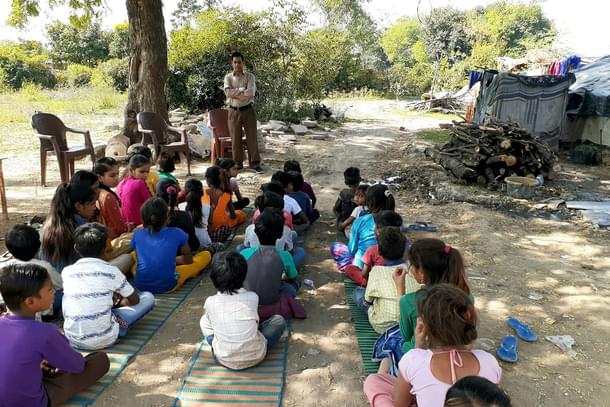
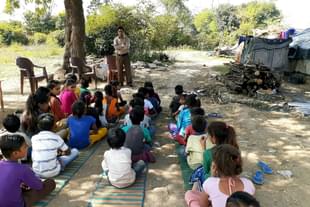
After a teacher at a government school in Vidisha district of Madhya Pradesh allegedly stopped children from the scheduled Gond tribe from entering, they were illegally admitted to an Islamic madrassa.
The child commission intervened in the matter after a social worker highlighted the matter.
While the state education minister and district administration are on the defensive and calling the allegations false, Swarajya found in a ground visit that the children’s version supports the allegations.
The children have now stopped attending the madrassa, but all have not yet been admitted to the state-run school. The social worker, Manoj Kaushal, is currently teaching the students at his centre.
In the report below, I detail the child commission’s intervention, the response of the administration to the commission’s notice, and the picture on the ground.
How The Child Commission Intervened
The matter came to light in news media after National Commission for Protection of Child Rights (NCPCR), commonly known as the national child commission, issued a notice to the district administration of Vidisha on 26 October 2022.
The notice, served under Section 13 of the CPCR Act 2005, directed the District Education Officer (DEO) at Vidisha to investigate the matter and present a detailed report within five days.
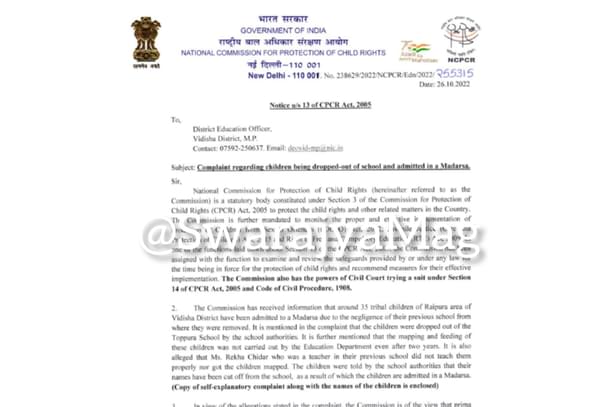
The notice said that the commission had learnt that around 35 tribal students from Raipura area of Vidisha town had been admitted to a madrassa due to negligence of teachers at Toppura government school.
The children had dropped out of the school after school authorities did not let them enter, citing their untidy appearance. The education department had not mapped these children even after two years of their going to the school.
(Mapping is a process where children get their Aadhaar cards and Samagra identity cards linked with the state education portal).
The notice further said that a teacher named Rekha Chidar was failing in her duty to teach the children. This was a case of violation of child rights under provisions of Right of Children to Free and Compulsory Education Act 2009 and the Juvenile Justice Act 2015.
In the notice, the commission asked district officials to carry out a survey in Vidisha to find more such students who had dropped out of school due to non-mapping.
Administration’s Response To Commission’s Notice
After the commission’s notice, the district collector, Umashankar Bhargav, told the media that allegations made in the notice were found to be false in investigation.
“The notice from the commission, which mentions 35 Gond students being sent to madrassa, was found to be wrong in the investigation. Out of these students, 22 have been enrolled in Toppura government school. No student was found to have been admitted to the madrassa. These children live near the madrassa so it is possible that they could have gone there on their own. Our investigation says that no child is enrolled in the madrassa,” Bhargav was quoted in the media as saying.
The state Home Minister, Narottam Mishra, also called the allegations that Gond students were attending the madrassa as false. He told the media, “This news that 35 Hindu students have been admitted to a madrassa is false. Our investigation revealed that all of them were admitted to the government school. The state has shared the report with the child commission.”
Priyank Kanoongo, chairperson of NCPCR, told Swarajya that the response of the district administration and state education minister had not come to him in writing yet, and he would not respond to their statements quoted in news reports.
He said he would send another notice to them for their written response for further action.
Kanoongo added that he had directed the state education department to immediately map all students from the slum area, and other such areas as well, who are either dropping out of school or studying in any madrassa.
Ground Visit
This correspondent visited Vidisha town on 6 November. The town is around 54 kilometres from the state capital city of Bhopal. One can board either train or bus to reach the place from Bhopal Railway Station.
From the railway stop, the basti where these children live is around four kilometres. It is secluded from rest of the town. Names on the shops on the road leading to the basti suggest a heavy Muslim population.
I head straight to meet Manoj Kaushal, the social worker who took the case to the commission.
Outside a scrap shop in Nayapura area, some children are playing while one of them is selling iron nails. Kaushal arrives on his bike and says, “These are the children you have come to meet.”
He then directs them towards the ground where he takes classes.
He says he heads a social organisation named ‘Shiksha Sewa Samiti’, under which he and his friends teach students in slum areas thrice a week. Kaushal is otherwise employed as teacher at a private college.
A small passage through a big empty ground leads to the spot. One can see sewage water coming out on road, and several houses made of tarpaulin sheets and mud bricks.
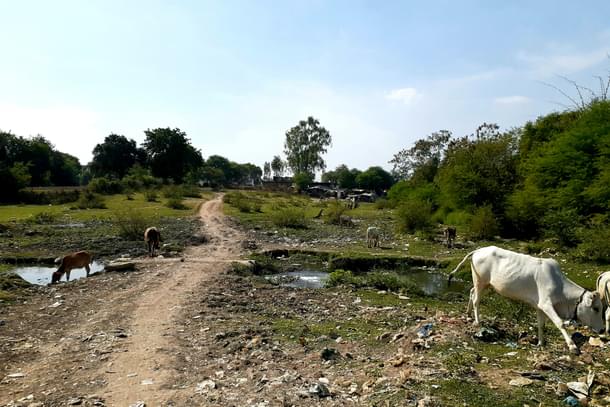
The spot resembles a waste dumping site that is a feature of large cities. Kaushal says, this is Raipura basti.
A resident sitting outside a house says he is “Adivasi”. Asked about his caste, he says he is a Gond, as are all residents of the basti. Kaushal says they have all migrated from Devas city of Madhya Pradesh and hence have a Rajasthani accent.
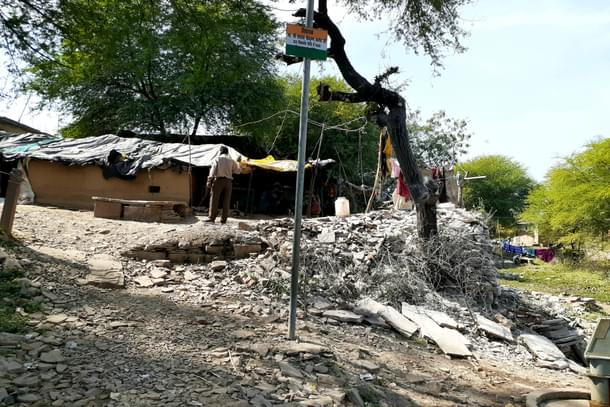
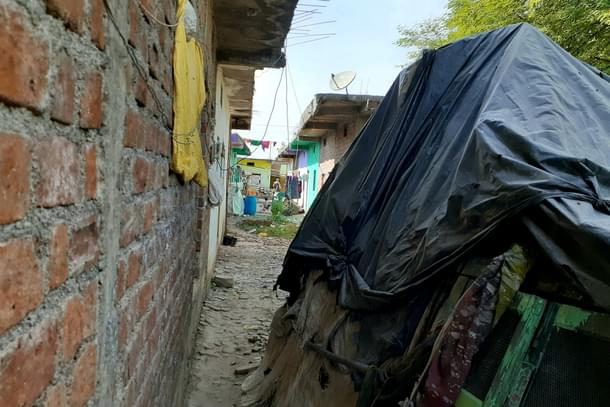
After crossing some fencing and narrow lanes, we stop by a temple. The door of the temple is closed. Outside it, a man is chiselling a stone into a grinder. He says it is his ancestral work. “All of us do the same work,” he says.
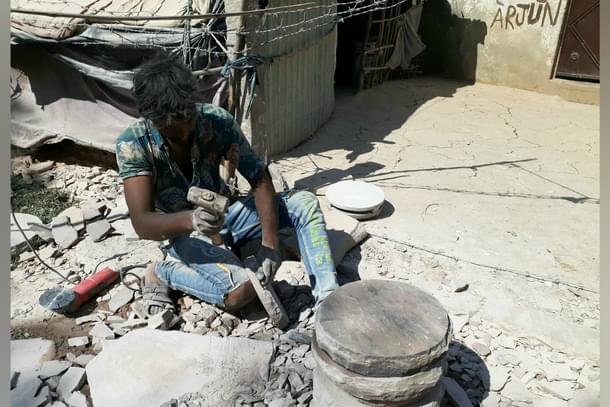
A few metres away from the temple is a tree, under which children have started gathering. They are carrying their mats. Kaushal says the mats have been provided to the children by his organisation.
Kaushal calls out some names. Seven children appear before us. Kaushal says they are the children who were attending the madrassa.
I ask them why they began going to the madrassa. One of them says, “Rekha Mam did not allow us to enter the class. She said we do not take bath, hence we should not come to school.”
Another child says, “She used to be constantly hooked to her phone. She never taught us or gave any homework. She would make us stand outside the classroom saying we aren’t mapped, and so we cannot attend classes.”
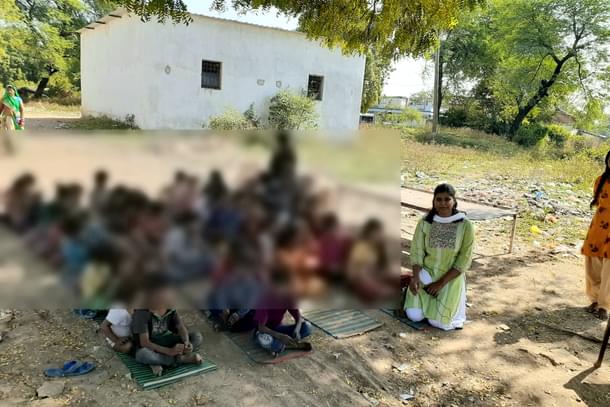
Watch the statement of these children given to this correspondent here.
The children say that one day, a woman from the local madrassa came to their basti. She noted down their names and details of their Aadhaar cards. She said they had been enrolled in the madrassa.
Watch the children’s statement here.
I tell Kaushal I would like to visit the madrassa and talk to the staff there. He says the premises had been closed due to media scrutiny. The school, he says, was closed for the day, and if I went there, I would find no one to talk to. “The school is located on the same street as the madrassa. That area is called Toppura,” he says.
A week before my visit, a team of journalists from Hindi daily Dainik Bhaskar visited this site.
This is what they reported on 30 October: When they talked to the madrassa staff, they said it had 45 students, out of which about half were Gond Hindus and the rest were Muslims.
They said that the claim that 35 students who were not allowed to enter the school have enrolled in the madrassa, is false, but seven Gond children were indeed enrolled in July.
When the Bhaskar team checked the register of the madrassa, it showed seven new enrolments in July — all Hindu names.
The newspaper quoted a teacher at the madrassa saying that out of those seven, only four were actually attending the madrassa.
The teacher said the madrassa was receiving government aid, and had been functional since 2002. It operated out of a small room. There were four teachers at the madrassa — three Muslims and one Hindu.
The Bhaskar report said that the teacher they talked to was Hindu, named Suresh Kumar Arya, and when the journalists asked him to show the books taught at the madrassa, he showed reluctance.
When asked about the findings of the Bhaskar team, Kaushal said that although only seven names were added to the register, several other children were attending the madrassa with them.
“Children go where their friends go. So if seven were enrolled, others would just accompany them. In this way, more than 40 children from this basti were attending it,” he said.
Kaushal said the madrassa is being run by a family.
The Bhaskar report also quoted the teacher, Rekha Chidar, against whom allegations of discrimination have been made. Chidar rejected the allegations, calling them baseless.
She said she never stopped anyone from coming to the school instead she was the one who called them to the school. Kaushal told this correspondent that Rekha Chidar belongs to a Scheduled Caste.
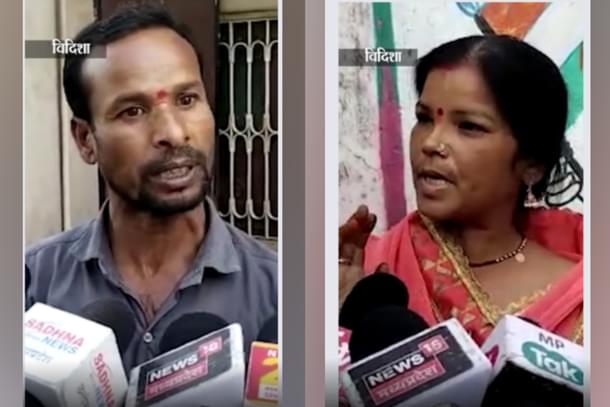
We met the father of one of these seven students. Khuman Singh said his child was not allowed to enter the school for not having papers in place. He said he and his wife remained busy all day.
Asked about the madrassa, he said he did not know about it. “We send our child to Manoj sir,” he said.
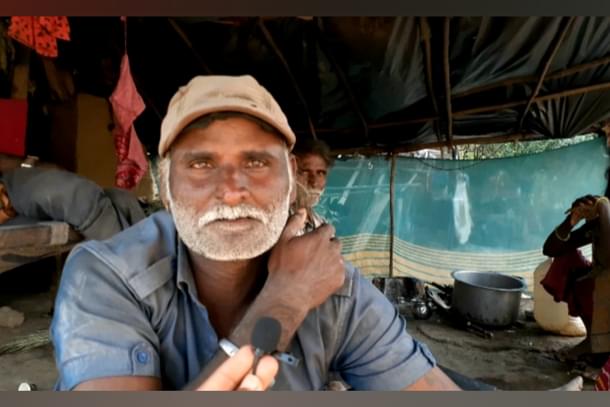
I ask Kaushal why he complained to the NCPCR. Kaushal says, “Madrassa is an Islamic teaching institution. They are mostly run inside mosques. The one at Toppura is no different. Though it is government-aided, they teach only Quran at elementary level. Everyone knows it.”
He says that parents in the Raipura basti are poor, and do not have time or wisdom to focus on their children’s education.
“When I saw Gond children going to the madrassa, it was alarming to me. I feared that the alims and maulvis would convert the children to Islam. They could have got these children circumcised,” he says, adding that several such cases have come to light from cities including Bhopal, Raisen, Vidisha, Ganj Basoda and Damoh.
Kaushal says he takes time off on weekends to visit the basti and teach poor children. I ask the children if they like coming to “Manoj Sir’s classes”, they reply with a unanimous “yes”.
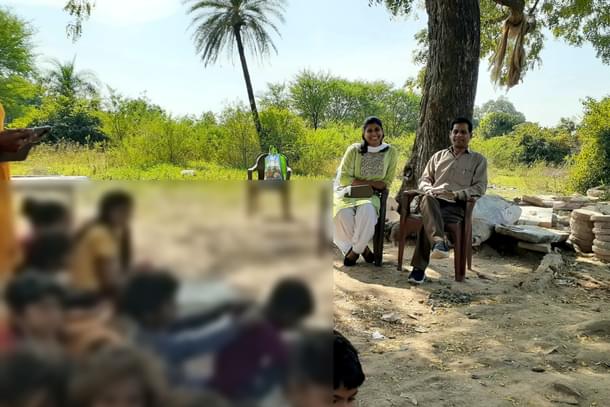
Kaushal says the children had been attending the madrassa for four months, but he learnt about it only recently.
“Studying at a government school is their basic right. I tried to help them with that. I cannot ignore what is going on here and let them convert to Islam just because they are unaware of their rights. They have a choice and I will make sure they do not lose their identity only because they are ignorant of their rights,” says Kaushal, who is from ‘Soni’ jaati, which comes under backward castes.
He says that several Gond children have still not been enrolled in the school. “Their parents are sending them to me. I am happy teaching them here. Their parents can see me — I am not bringing any religious books to these classes. I want to provide them with basic education.”
He says he would teach the children till every one of them is enrolled in the government school.
(The ground visit was made by Subhi Vishwakarma while the report has been edited by Swati Goel Sharma).





